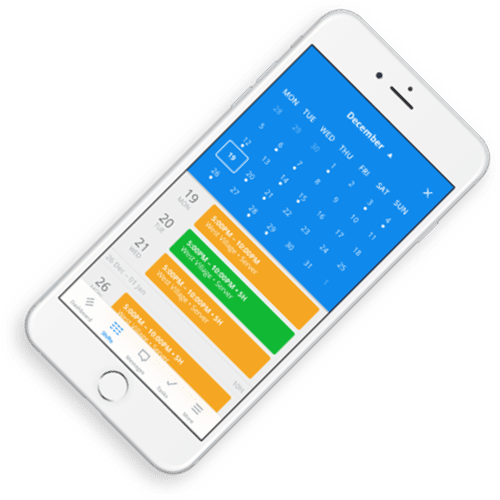Top 10 Field Service Management Software for 2024
Learn about field service management software, the key components to look for, ...

In many industries, the night shift is a necessary part of the regular workday. Businesses operate through the night to produce as much volume as possible and meet the demands of the market.
But employees tasked with working these irregular shifts for prolonged periods of time can suffer from a variety of health issues. What are these issues? And what can be done to prevent them from happening?
In this article, the experts at Sling reveal the effects of working night shifts and how to combat them.

Working the night shift forces your body to operate on a schedule that goes against its natural circadian rhythms. Most of the time, it’s not a good idea to go against what mother nature put in place.
That said, it is possible to retrain your body to sleep during the day and stay awake during the night. But if this retraining isn’t done correctly—or isn’t done at all—you can begin to suffer serious medical issues. Here’s how working the night shift can affect your health.
Sleep is extremely important for your overall health. While you slumber, your body gets rid of toxins, repairs injury, and reduces stress. Working the night shift interferes with those essential processes. That can lead to many of the disorders on this list.
Women who work overnight are at much greater risk of contracting breast cancer than those who only work during the day. And it doesn’t matter if you work the night shift consistently or just one night a week.
A 2012 study in the British Medical Journal concluded that working the night shift caused a seven-percent increase in the likelihood that a person would suffer a heart attack. The study did not address why the risk was greater for those who work the night shift, but researchers theorize that the change in sleep habits affects blood pressure and circulation.
Working the night shift also has a negative impact on your mental health. Numerous studies show that the risk of depression and mood disorders increase when you work the night shift.

Working the night shift means working against your body’s natural inclination to turn off certain key functions like consciousness and mobility. You can certainly force yourself to stay awake and mobile, but your body still wants to shut down.
That leads to a reduction in focus, attention, productivity, and fine motor skills. In certain jobs, when you’re not able to give your work complete attention, the risk of injury increases dramatically.
Your metabolism is mostly governed by your hormones. The hormone leptin, for example, plays a critical role in regulating your weight, blood sugar, and insulin levels.
Working the night shift interferes with the production and circulation of this vital hormone. That can lead to the next set of disorders on this list.
Sleeping during the day and working at night increases your risk of obesity and diabetes. In the case of night-shift workers, these disorders are caused by an imbalance in hormone production. The real danger here is that even if you eat a healthy diet, the hormone imbalance can still lead to obesity and diabetes.
If you work the night shift for prolonged periods of time, all the effects mentioned above can accumulate and cause gastrointestinal problems like diarrhea and ulcers. That can compound the problems you already have and lead to more serious medical concerns.

When you work the night shift, you are exposed to light during hours of the day when your body expects it to be dark. This reversal of light and dark suppresses melatonin production and release. Melatonin is responsible for controlling the sleep and wake cycles.
This decrease in melatonin levels means that when you try to sleep during the day, you won’t sleep deeply or get enough sleep for your body to repair itself. As a result, you may suffer from long-term sleep deprivation, which is incredibly bad for your health.
Vitamin D is essential for your health. It assists with the absorption of calcium and promotes bone growth. Too little vitamin D results in osteomalacia (misshapen bones) along with a whole host of other disorders, such as:
You can get vitamin D by eating foods like cheese, yogurt, tofu, and salmon. But you absorb the vast majority of vitamin D from sunlight. When you work the night shift and sleep during the day, your body doesn’t get the vitamin D it needs to function properly.
If you’re stuck working overnight, don’t worry. There is good news among all this bad news: you can combat the effects of working the night shift. Here are 10 easy ways.

Managers should do their best to slowly transition employees from the day shift to the night shift. At the very least, this gives their body time to adjust to the new schedule.
If you’re a busy manager faced with organizing team members on multiple day and night shifts, a scheduling app like Sling can simplify and streamline the process considerably.

Sling is a suite of scheduling, time-management, and communication tools designed to keep employees organized, engaged, and on task. Sling is loaded with intuitive tools, like:

On top of all these powerful tools, Sling provides guidance and helps you avoid conflicts by notifying you about availability, time-off requests, overlapping shifts, and double-bookings. Sling even gives you your very own social media platform.
With Sling’s Newsfeed feature, you can share work files, photos, videos, and links with each and every team member. Sling helps you bring everyone together, keep them organized and informed, and build a better company culture. What more could you ask for from a free app?
Your family’s cooperation is critical if you hope to be successful working the night shift. You will all need to work together to balance such essential activities as:
You will also need their help in establishing quiet hours so you can get the sleep you need to function at night.

Caffeine is a stimulant that is used to give you a quick boost of energy and keep you awake. The problem with caffeine lies in the fact that it stays in your system for hours after you feel the effects, and it can prevent you from sleeping well after work.
Drink water whenever possible to avoid the problems caused by caffeine.
Alcohol can make you fall asleep faster, but it also reduces rapid-eye-movement (REM) sleep. REM sleep is the restorative phase of your sleep cycle, so if you interfere with that by consuming alcohol, you effectively interfere with your body’s ability to repair itself.

When you’re not working, try to spend at least 30 minutes in the sun. Go for a walk, work in the garden, exercise outdoors, or even just sit and read a book. Doing so will provide your body with the vitamin D it needs to keep you healthy.
Sleeping in the right environment can have a big effect on how well and how long you sleep. Here are five ways to ensure that where you sleep isn’t interfering with your quality of sleep:
These simple steps make it possible to get the best night’s sleep every time, even if you sleep during the day.
The nicotine found in cigarettes, vape pens, pipes, and all forms of tobacco is a natural stimulant. You may feel like you need a cigarette before bed to relax, but it’s all in your head.
When you introduce nicotine into your body, your heart rate increases, your breathing becomes faster and shallower, and your blood pressure goes up.
These are the opposite conditions your body needs to fall asleep. In essence, then, you are sabotaging your sleep by smoking before bed.
Smoke your last cigarette at least three hours before your bedtime. This will give your body time to process the nicotine out of your system.
Electronic devices like computers, tablets, and televisions emit light in shorter wavelengths (toward the blue end of the visible spectrum).
This blue light causes your body to produce less melatonin — a hormone that regulates circadian rhythms. Because of this lack of melatonin, your body will be less inclined to slow down and fall asleep.
To prepare your body for sleep — especially after working the night shift — turn off your electronics at least an hour before you go to sleep. If possible, avoid fluorescent light (incandescent lights are okay) and sit for a while in a dimly-lit room.

Eating a healthy diet is another way to combat the negative effects of working the night shift.
If you work the night shift consistently, try to eat the same way you would during the day even though you may feel like consuming less.
Eat frequent light meals and healthy snacks in order to avoid the drowsiness that comes with rich, heavy meals.
Similarly, choose foods that are easy to digest (e.g., fruits, vegetables, bread, rice, and pasta) so your body can focus on staying awake rather than diverting resources to keeping you nourished.
Here are a few more tips to help you build a healthy diet:
When you find the diet that works best for you, plan on taking these foods to work with you so you don’t fall back into old habits and eat in a way that causes you to fall asleep at the wrong times.
You may not need to during the day shift, but taking a nap during the night shift can become essential to helping you work safely.
A short 20-minute nap can restore energy levels and keep you alert and vigilant throughout the night.
Try not to exceed 45-minute naps or you run the risk of straying into the deep-sleep cycle. If you force yourself to wake up during this period, you will not feel as refreshed and it will take you longer to feel alert again.

The night shift isn’t for everyone. Some people’s bodies just can’t handle the stress of working at night.
If working the night shift is causing you too many health problems, talk to your doctor. She can recommend to your employer that they switch you to the day shift. Doing so can have a profoundly positive effect on your overall health.
Most managers will do their best to accommodate their employees if they have significant problems with working the night shift.
Many times, though, switching to the night shift just takes practice. It’s a skill like anything else, and the more you do it the easier it will become.
The tips we’ve given you in this article are a big part of making your practice more effective. Do your best to incorporate our suggestions and you’ll soon find your body adapting to the night shift and the health impacts decreasing.

After discussing all the negative effects of working night shifts, you might wonder why anyone in their right mind would do such a thing. The answer might surprise you.
There are actually some significant beneficial effects of working night shifts — if you work hard to implement the suggestions in the previous section and minimize the negative aspects mentioned earlier in this article.
Here are some reasons you might consider working while it’s dark outside.
One of the biggest beneficial effects of working night shifts is the chance to earn higher pay.
Depending on the industry and the skills required, some businesses offer significantly higher wages to employees who opt to work the third shift compared to the wages they offer to the employees who work the first and second shifts.
That difference in pay can really add up over the long term.
For example, earning a dollar more per hour for working the night shift can create an extra $2000 annually — all without working any overtime.
Work some weekends or holidays, or accumulate some overtime here and there, and the extra money you bring in by working the night shift can make a very real difference.
If you’re looking for ways to show that you’re a team player and that you’re committed to the company, volunteering to work the night shift might be the way to go.
Being willing to go where you’re needed most shows that you want to help the business be as successful as possible. Management and others on your team will recognize that.
Keep in mind, though, that being a team player isn’t the only trait managers look for when considering promotions and the like. Work experience, education, skills, character traits, and leadership all come into play.
The day shifts are often filled with employees who have been working for the company for a long time.
They have more seniority and more experience so it can be hard for someone further down the ladder to stand out and make their way up the corporate ladder.
The night shift, on the other hand, suffers from high turnover — as team members strive to get back on days — and is often filled with employees who have only been there a short time.
For someone willing to commit to the night shift, this is the perfect opportunity to make your mark and get ahead without all the extra competition.

Another beneficial effect of working night shifts is more autonomy and less micromanagement. While the day shifts may have one, two, three, or even four managers on duty at the same time, the night shift may only have one manager on duty.
Depending on the industry, that may mean you can work with less supervision than your counterparts on days.
If you have trouble focusing on the task at hand because of all the meetings, discussions, and management input and you enjoy working autonomously, the night shift might be the right choice for you.
If you want to establish your expertise in the business, consider working the night shift. The high turnover rate we discussed earlier means that those who stick it out on the night shift will quickly become the expert at their particular job.
Less-experienced team members will come to you with questions and management will turn to you to help get the new hires up to speed.
That can set you on the fast track to career advancement and give you a leg up that you might not have had if you’d stayed working the day shifts.
Similarly, when you are the “expert” at a particular job or skill, you’ll have more opportunities to exercise leadership.
While you can certainly display leadership qualities on the day shift, the lack of skilled employees willing to commit to the night shift means that your efforts will stand out more than they would in other cases.
When you’re willing to lead, and you get the opportunity to do so, management will notice and certainly factor it into their decision-making process when it comes promotion time.
Again, this isn’t the only thing they’ll look at, but it can play a big part in helping you move toward higher pay and more responsibility within the company.

Along with the autonomy we mentioned earlier in this section, another benefit of working night shifts is fewer distractions.
Not only will there be fewer managers making their rounds, but there will also be fewer phone calls, fewer customers and clients coming in, fewer emails to contend with, and an overall reduction in activity around you.
Most night shifts are made up of a skeleton crew — just enough to keep things running — so there will be fewer opportunities for those team members to interrupt one another while the work is going on.
If you prefer a quiet, less harried work environment with fewer distractions, the night shift might be the place for you.
If you’re interested in working in a specific industry or even a specific business, working the night shift might be a good way to get your foot in the door.
We’ve all heard stories of CEOs who started out in the mailroom and worked their way up within the company. While the mailroom has largely gone the way of the dodo, the 21st-century equivalent is the night shift.
If you’re finding it impossible to get hired to work days in your preferred industry, try applying for the night shift. Doing so doesn’t mean you have to stay there forever.
If you show that you’re a team player, can work without supervision, establish your expertise, and become a leader among your team, you may have the opportunity to switch to the day shift somewhere along the line.
Most day shift employees work 8 a.m. to 5 p.m. and then go home to spend another five hours on other activities. In many cases, though, the opportunities for education and training stop at 5 p.m. as well.
But, with the night shift, you finish work during the time when most universities and colleges offer the bulk of their classes.
For example, you could work from 11 p.m. to 8 a.m., go home for a quick bite to eat, and then head to your local educational institute for a 9 a.m. class.
Instead of spending the last five hours of your day at home like the day shift employees, you can spend that same amount of time furthering your education.
Depending on where you live and where your job is located, you may enjoy a less stressful commute from working night shifts.
In large cities, traffic jams before and after the day shift make getting to and from work a real headache.
When you work the night shift, you’re going in the opposite direction of the majority of the other drivers on the road (e.g., out of town when everyone else is going into town, and into town when everyone else is going out of town).
If you don’t have a car, you’ll need to factor in whether public transportation will run late at night and early in the morning, but, even then, there will be fewer people on the bus and in the subway to create potential delays.

Before making the switch to overnight work, review both the positive and negative effects of working night shifts as well as what you can do to make the transition easier.
Write down your goals and objectives — for both your career and your personal life — and then decide whether the day or night shift fits better for your unique situation.
You may even want to talk to someone who has worked, or currently works, the night shift to get their thoughts on the situation.
Taking the time to think things through is a great way to clarify things in your head so you can make the right decision.
If you’re a manager and one of your team members is considering night shift work, encourage them to go through the process outlined above so they have all the information to make their decision.

Managers who want to provide the best work schedule for their employees — be it the day shift or the night shift — integrate software like Sling into their workflow.
No matter the size of your business or how many shifts you contend with, Sling helps you build your team’s work schedules in the shortest amount of time possible.
With Sling’s powerful suite of tools, you can:
The built-in artificial intelligence will even notify you of overlapping shifts, double bookings, and other mistakes in your schedule.
Sling truly is an all-in-one, turnkey solution for your employee shift-scheduling issues.
Right now, you can get everything you need to schedule employees and handle internal communication by getting started with a free account on our website.
For more resources to help you manage your business better, organize and schedule your team, and track and calculate labor costs, visit GetSling.com today.
See Here For Last Updated Dates: Link
This content is for informational purposes and is not intended as legal, tax, HR, or any other professional advice. Please contact an attorney or other professional for specific advice.
Schedule faster, communicate better, get things done.